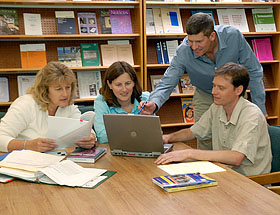 An instructional coach is someone who works with teachers, principals and other adults working in a school. In the same way that an athletic coach teaches players the rules of the game and how to improve their playing, a coach working in a school will work with teachers to improve their performances in the classroom. Though there are only a handful of colleges offer programs in this field of study, you can gain the experience and skills needed to work as a coach.
An instructional coach is someone who works with teachers, principals and other adults working in a school. In the same way that an athletic coach teaches players the rules of the game and how to improve their playing, a coach working in a school will work with teachers to improve their performances in the classroom. Though there are only a handful of colleges offer programs in this field of study, you can gain the experience and skills needed to work as a coach.
What is Instructional Coaching?
Instructional coaching is a relatively new professional career that involves teaching educators how to do better in the classroom and improve the performances of their students. These coaches conduct independent research to determine the best way to incorporate new materials and how to better cover topics in elementary, junior high and high schools. They also research changes in the way students learn and react in different situations. Coaches can then use that research to show teachers how they should react and what they can do to keep kids interested in their work.
Who Will You Work With?
When you work as a teacher, you primarily focus on your students. You present different topics to them, help them understand those subjects and may work independently with students after school too. An instructional coach has little to no interactions with students. The teachers you work with are essentially your students. You will generally spend some time working with the principal and superintendent to get an idea about the problems the school and the teacher has. You will then spend most of your time working with the teachers in small group settings. This lets you present new concepts and ideas in a way that ensures everyone understands the materials.
How to Become a Coach
According to Elena Aguilar, a former coach, you need both experience and education. Aguilar recommends that you gain some experience as a teacher in an educational system before you work with a master coach. A master coach can give you feedback regarding your performance and help you understand what coaches do every day. Aguilar believes that coaches should have a minimum of 5,000 hours coaching under a master coach and that some may need as much as 10,000 hours of fieldwork. Depending on where you decide to work, you may seek employment with just a bachelor’s degree and a teaching certificate, but some employers require that coaches have a graduate degree.
Where Will You Work?
As an instructional coach, you can work in a school, for an educational company or for a school district. School districts often hire coaches to go out and work in each school within that district. You might spend a week or a month working in one school before moving onto another school, and you’ll later come back to monitor the progress of the teachers you worked with in the past. Some schools hire coaches to work full time with teachers as well.
Related Resource: PRAXIS Test
Educational coaches strive to help teachers better their performance. They work in small group settings, in schools and districts or for educational companies. As an instructional coach, you’ll spend just as much time doing research on your own as you do working with teachers to help them improve their classroom skills.